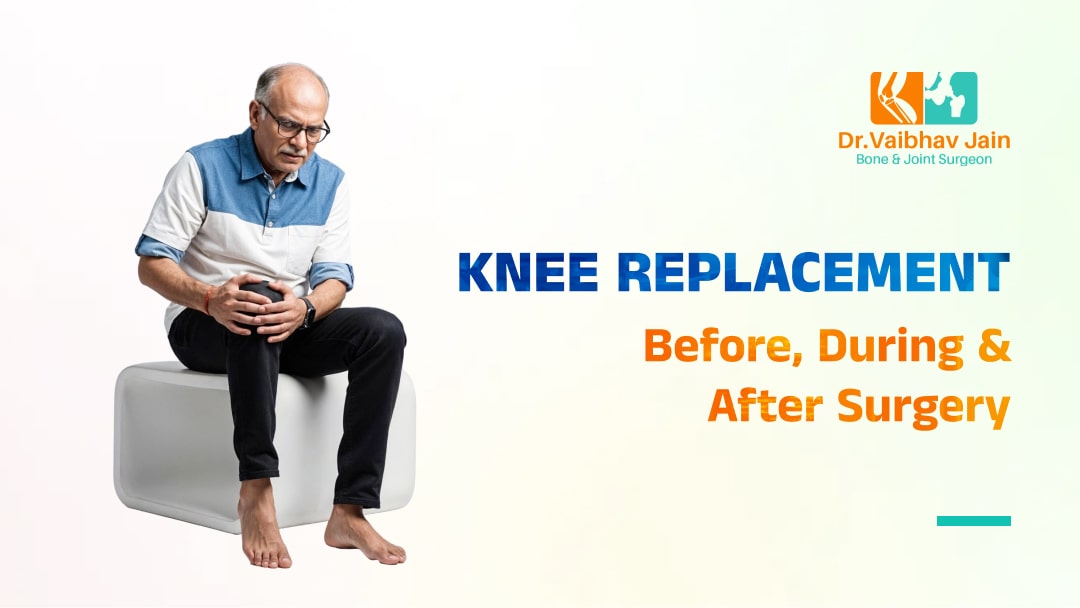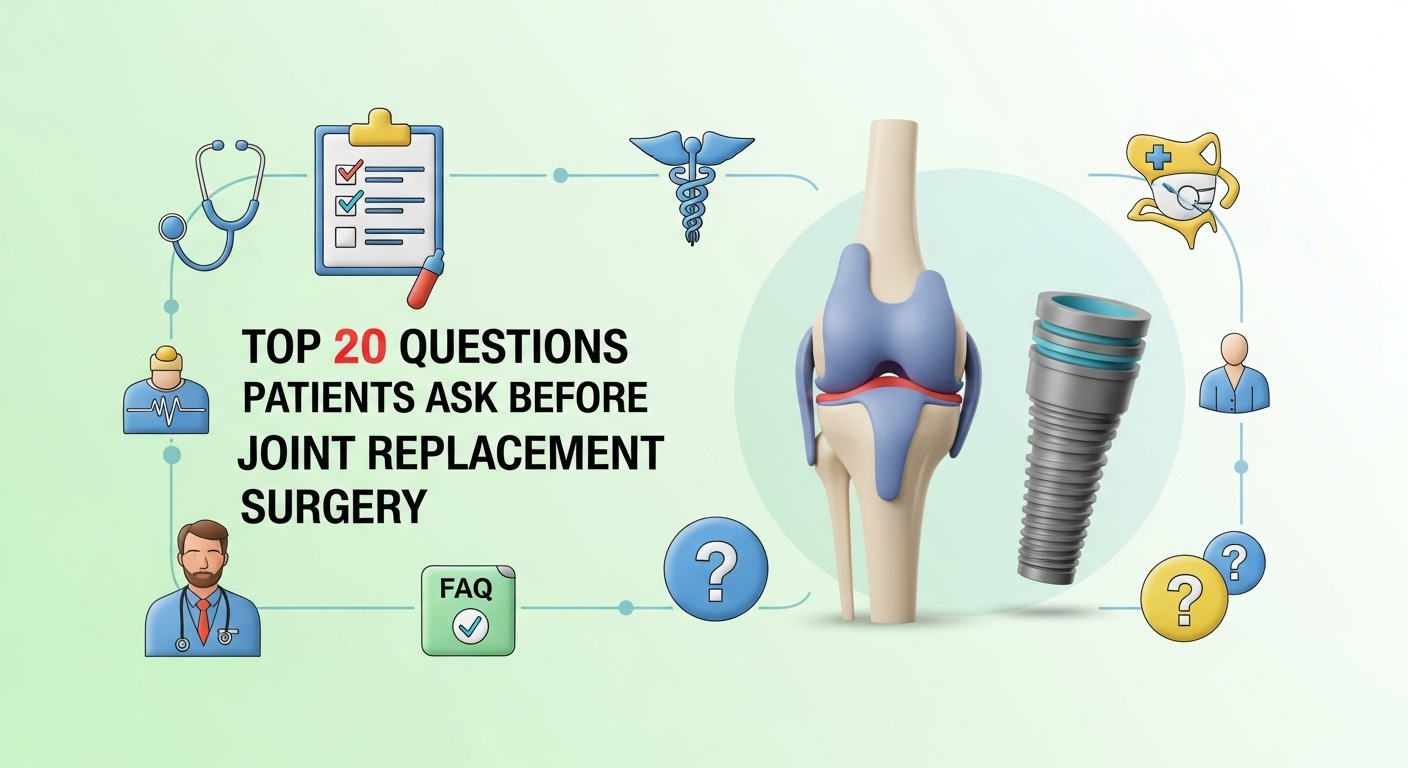If you have long-term knee pain from arthritis, an injury, or wear and tear, knee replacement surgery might help you live a more active, pain-free life. But it’s very important to pick the right doctor for the best results. Dr. Vaibhav Jain is Best Orthopedic Surgeon for Knee Replacement. With over 15 years of experience, he has successfully performed more than 6,200 surgeries. In this blog, we’ll explain what happens before, during, and after the surgery. This will help you understand each step easily.
Why Choosing the Right Knee Replacement Surgeon Matters
Getting a knee replacement is a big decision, and choosing the best surgeon makes a huge difference. A skilled doctor can help you heal faster, avoid problems, and get you back to your normal life. Good surgeons have lots of experience, use the latest techniques, and care about your recovery. Picking the right one means less pain, better results, and a smoother journey back to feeling great.
Before Surgery: Consultation & Preparation
Before surgery, you’ll talk with your doctor and get ready. This helps keep you safe, lower risks, and makes sure everything goes well. Here’s a step-by-step guide to what typically happens before surgery:
1. Your First Check-Up
The best knee doctor will:
- Ask about your health history
- Check your knee with tests like X-rays or MRI
- See how much pain you have and how well you can move
2. Making a Plan Just for You
- Talk about surgery choices (full knee replacement or partial)
- Explain how you’ll sleep during surgery (general or spinal anesthesia)
- Tell you what to expect after surgery
3. Getting Your Body Ready
- Healthy habits: Stop smoking, control diabetes
- Easy exercises: Strengthen your leg muscles before surgery
- Food & medicines: Avoid blood thinners (like aspirin) before surgery

During Surgery: What Happens in the Operating Room?
When you have knee replacement surgery, a skilled surgeon follows careful steps to give you a new, pain-free knee. Here’s what happens in simple terms:
1. You Get Medicine to Sleep (Anesthesia)
- You’ll get special medicine so you don’t feel any pain during surgery.
- You might be fully asleep or just numb from the waist down.
2. The Surgeon Makes a Small Cut
- Instead of a big cut, the surgeon makes a small opening.
- This helps you heal faster with less pain.
3. Removing the Damaged Parts
- The surgeon gently takes out the worn-out bone and cartilage (the cushion in your knee).
- This makes space for the new artificial knee.
4. Putting in the New Knee
- A strong, smooth metal and plastic implant is placed where your old knee was.
- It acts just like a healthy knee joint.
5. Closing the Cut
- The surgeon closes the small opening with stitches or staples.
- A clean bandage is put on to keep it safe.
After Surgery: Recovery & Rehabilitation
After knee replacement surgery, you’ll need time to heal and regain strength. Here’s what happens next:
- Hospital Stay: You’ll stay in the hospital for a few days. Doctors will help manage pain and get you moving.
- Physical Therapy (PT): You’ll start exercises soon after surgery to help your knee move and strengthen.
- Walking Again: You’ll use a walker or crutches at first, then slowly walk on your own.
Recovery Timeline
- First Few Weeks: Focus on reducing swelling and moving your knee. PT will be a big part of your day.
- 6 Weeks: Most people feel much better and can do light activities.
- 3-6 Months: Full recovery takes time. Keep doing exercises to make your knee stronger.
How to Identify the Best Orthopedic Surgeon for Knee Replacement?
To find the Best Orthopedic Surgeon for Knee Replacement, you need to research and think about a few important things. This will help make sure your surgery goes well. Here’s a step-by-step guide to help you choose the right surgeon:
- Proper Training – They should be certified and specially trained in joint surgeries.
- Lots of Experience – Choose a surgeon who has done many knee replacements (hundreds or more).
- Good Reviews – Check what other patients say about their results and care.
- Modern Techniques – The best surgeons use advanced methods like robotic or small-cut surgeries.
- Clear Explanations – They should answer your questions simply and explain what to expect.
Why Choose Dr. Vaibhav Jain for Knee Replacement?
Dr. Vaibhav Jain is one of the best doctors for knee replacement surgery. Here’s why so many patients trust him:
- Great Results: He has done over 6,200 surgeries with a high success rate. Most patients get long-lasting relief from pain and can move freely again.
- Caring & Clear: He listens carefully, explains everything in simple words, and helps you make the best decision for your health.
- Affordable Treatment: He offers quality care at fair prices and helps with insurance claims.
- Happy Patients: Many people who had knee surgery with him share positive stories about their smooth recovery.
Conclusion
If you need knee replacement surgery, picking the right doctor is very important. Dr. Vaibhav Jain is one of the Best Orthopedic Surgeon for Knee Replacement. He knows how to help patients get back to walking without pain. He also takes time to explain everything clearly so you know what to expect before, during, and after surgery. Book a visit with Dr. Vaibhav Jain today and take the first step to move without pain.
FAQs for Best Orthopedic Surgeon for Knee Replacement
1. How do I know if I need knee replacement surgery?
If your knee hurts a lot, and medicine or exercises don’t help, you might need an operation to fix it.
2. What makes Dr. Vaibhav Jain the best choice for knee replacement?
Dr. Jain has done over 6,200 knee surgeries successfully. He uses the newest methods to make surgery safer and recovery faster.
3. What happens before knee replacement surgery?
First, the doctor will check your health, take pictures of your knee, and help you get strong with special exercises before surgery day.
4. How long is recovery after knee replacement?
Most people walk with help the same day! Full recovery takes a few months, with physical therapy to make your new knee strong.
5. When can I walk normally after knee replacement surgery?
Many people walk without help in 4-6 weeks, but everyone heals differently. Your doctor will tell you what’s safe for you.







